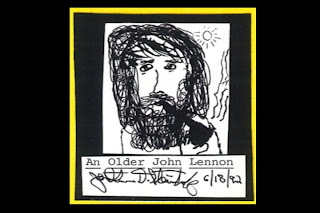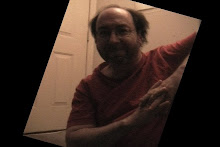I'm pleased to begin by making what I for one consider an important announcement: I'm currently at work on a new video, which will be a very brief excerpt from my new comedy scene, just posted a few days ago at archive.org, "Larry Houdini and Napoleon Escape".
Next:
Though I'm well aware that the point made by this following videoclip fails at being self-apparently valid, I feel that Letterman is falling way behind in his competition with Conan to make inside-references to me/my material, therefore I shall go ahead and credit them this one, though it be at personal expense to my own credibility among the "uninitiated" (as if I ever had credibility/credit with that group to begin with):
Third:
I'm continually getting the feeling that people who write articles at HuffingtonPost.com are reading my blogs, not just because of content but also because of timing. For example, a day or so following my blog wherein I state that Conan and Dave should go cold turkey on their need to ridicule anyone who uses pot, General McCafferty wrote a blog at Huffington Post where the title referred to an addiction to imprisoning people for "drug" use. By the way, I felt compelled to post a Comment to that article, as I think it's time someone started screaming about how certain commonly used phrasing ("substance abuse", "drug abuse", etc.) lumps the heroin addict together with the casual user of pot. It essentially generates a prejudice, inciting/promoting/sustaining/encouraging/suggesting, etc. a mindset against casual users of pot that is totally disconnected from reality.
Fourth:
I once sent to Paul McCartney for his birthday the following drawing (now contained within my collection of graphic artwork book, "Go Eyes, Go!"):
 This birthday gift led to the opening line on the opening song of his "Flaming Pie" music CD, "The Song We Were Singing":
This birthday gift led to the opening line on the opening song of his "Flaming Pie" music CD, "The Song We Were Singing":"For a while, we could sit, smoke a pipe,
And discuss all the vast intricacies of life"
And discuss all the vast intricacies of life"
By presenting the idea of sitting, smoking a pipe, and reflecting on things with another person, McCartney is clearly and deliberately taking the concept of smoking a pipe and playing on the different connotation pot brings to it, contrasted with what sitting and smoking a pipe meant in an earlier time. Because we are familiar with the context McCartney brings. My drawing, with its title, does the identical thing with a pipe, it plays on the once traditional connotation of pipe smoking as something an older person does, involving tobacco and reflection, contrasted with what pipe smoking means in the context The Beatles and/or Lennon brings. It also makes a larger point about the different context of our lives from those who lived before our time, and the need for redefinition this brings. We both make the point with the identical "prop" and in an essentially identical manner. Thus, as with many things McCartney brings to the world, this is something I brought to McCartney.
I bring it up today because President Obama seemed trapped by outmoded mentality when he had the cop and Gates come together for a beer. And now people having a beer together is burned into the idea of a dignified way to iron out what might from the outside appear to be racial tension. I therefore draw special attention today to the opening line of Paul McCartney's "Flaming Pie" music CD. Maybe those who sit together and pass around a pipe emanate a greater aura of dignity to a moment of coming together. Some will see things as I do.


